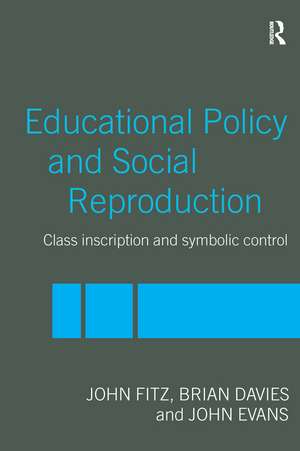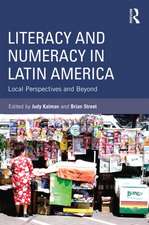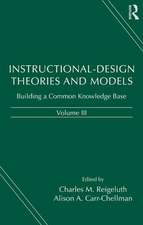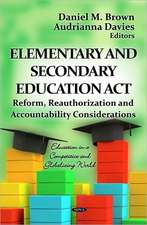Education Policy and Social Reproduction: Class Inscription & Symbolic Control
Autor John Fitz, Brian Davies, John Evansen Limba Engleză Hardback – 3 oct 2005
The authors locate their work within two broad strands in the sociology of education. Basil Bernstein’s work on the realisation of power and control in and through pedagogic discourse and social reproduction provides a theoretical framework for exploring the character of and continuities and change in education and training policies.
The book is an important contribution to debates about the extent to which education is a force for change in class divided societies. The authors also set out to re-establish social class at the centre of educational analysis at a time when emphasis has been on identity and identity formation, arguing for their interdependence. This book will be an important resource for students, policy analysts and policymakers wishing to think through and understand the longer term impact of programmes that have shaped secondary schooling in Britain and elsewhere.
| Toate formatele și edițiile | Preț | Express |
|---|---|---|
| Paperback (1) | 383.63 lei 6-8 săpt. | |
| Taylor & Francis – 3 oct 2005 | 383.63 lei 6-8 săpt. | |
| Hardback (1) | 1052.35 lei 6-8 săpt. | |
| Taylor & Francis – 3 oct 2005 | 1052.35 lei 6-8 săpt. |
Preț: 1052.35 lei
Preț vechi: 1283.35 lei
-18% Nou
Puncte Express: 1579
Preț estimativ în valută:
201.39€ • 209.99$ • 167.37£
201.39€ • 209.99$ • 167.37£
Carte tipărită la comandă
Livrare economică 20 martie-03 aprilie
Preluare comenzi: 021 569.72.76
Specificații
ISBN-13: 9780415240048
ISBN-10: 0415240042
Pagini: 168
Ilustrații: 9 tables and 5 line drawings
Dimensiuni: 156 x 234 x 11 mm
Greutate: 0.39 kg
Ediția:New.
Editura: Taylor & Francis
Colecția Routledge
Locul publicării:Oxford, United Kingdom
ISBN-10: 0415240042
Pagini: 168
Ilustrații: 9 tables and 5 line drawings
Dimensiuni: 156 x 234 x 11 mm
Greutate: 0.39 kg
Ediția:New.
Editura: Taylor & Francis
Colecția Routledge
Locul publicării:Oxford, United Kingdom
Public țintă
PostgraduateCuprins
1. Understanding policy, understanding pedagogic discourse Introduction Bernstein’s sociology, a language for policy On our omissions 2. Framing Equality? The Education Act 1944 Introduction Policy frameworks The 1944 legislation A governing partnership? Tripartism: a very British settlement? Conclusions 3. Selection, class and opportunity Introduction Selection and social class Selection and social class and school composition Greater equality of opportunity? Whatever Happened To The Likely Lads? Conclusions 4. Comprehensive schooling: Challenging inequality ? Introduction Going comprehensive from the ground up What was driving the change? 10/65 and after: Comprehensive Schooling and its challenges Neighbourhoods and differentiation between schools Conclusions 5. Educational Systems and Social Mobility Social mobility and education Social mobility, selection and comprehensivisation Social Mobility, Meritocracy and Education Conclusion 6. Bernstein, social reproduction and intergenerational transmission Introduction Pedagogic discourse; family, school and work Pedagogic discourse, policy and reproduction Pedagogic discourse: its key features Sifting and Sorting Privileging practices Resources Conclusions 7. Something happened: the policy framework post 1988 Introduction Centralisation: reasserting central authority, putting on the pressure Choice and diversity: power to parents? Conclusion 8. Diversity: selection and stratification? Introduction From diversity to plurality ‘New’ Labour and school diversity The Early Years Specialist Schools Academies Beacon Schools and Leading Edge Partnerships Federations and Diversity Pathfinders Faith-based schools The modernisation of comprehensive schools School diversity and social equity Conclusions 9. Further reading Bibliography
Notă biografică
John Fitz, Brian Davies, John Evans
Descriere
This book develops the current debate on the extent to which education is a force for change in a class-divided society, placing notions of class, power and control at the centre of the issue at a time when emphasis has been on learner identities.




















